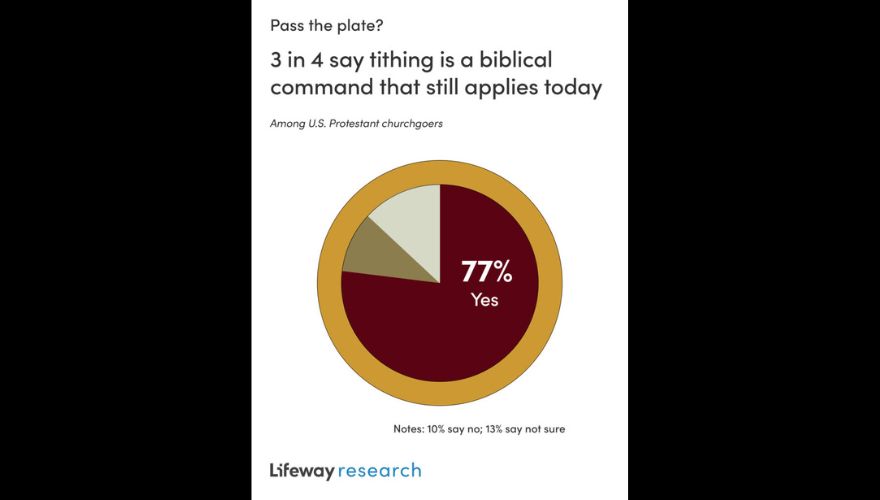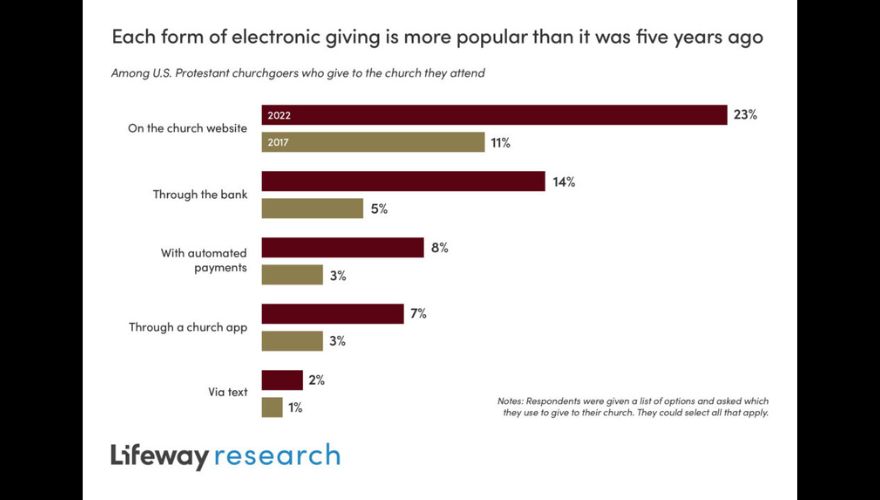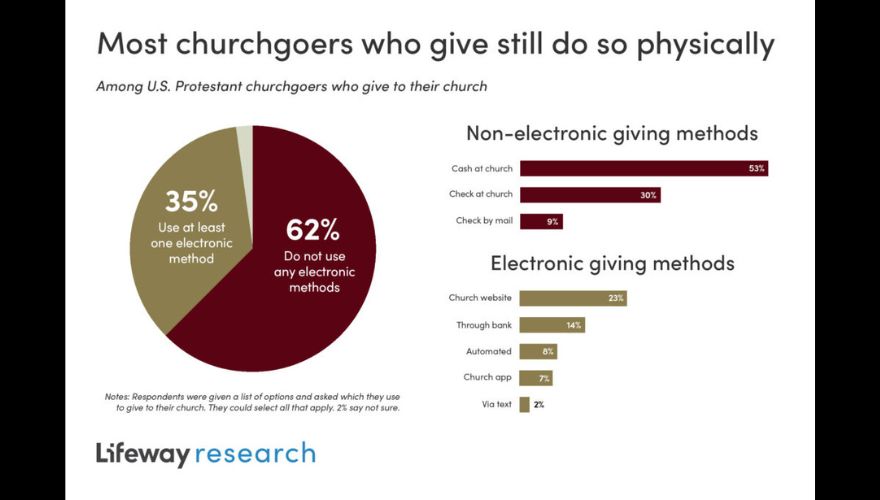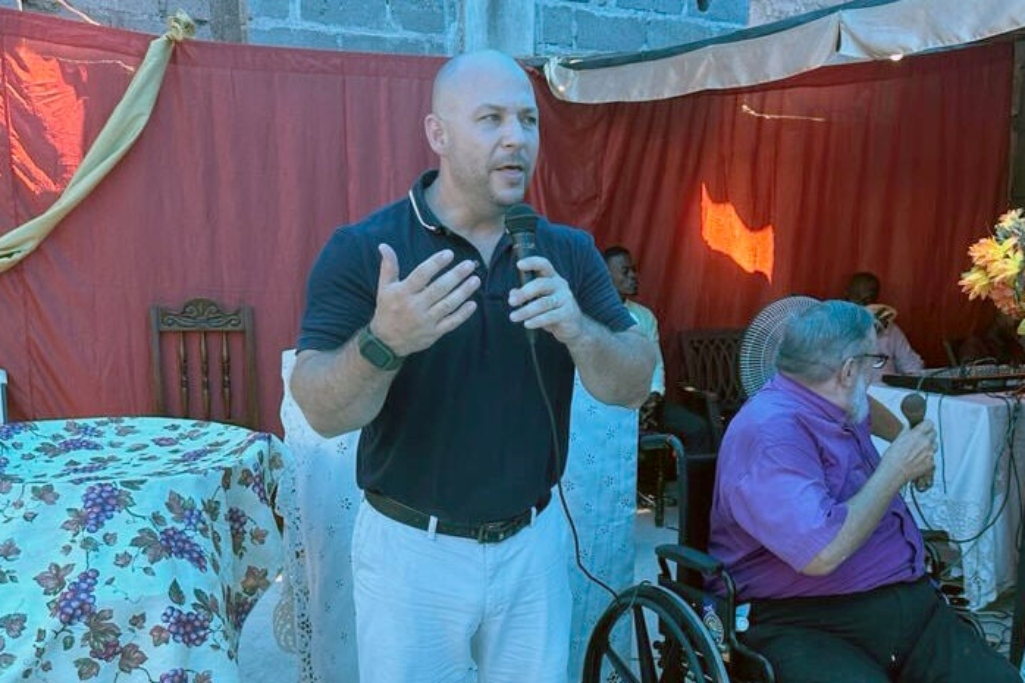
BRENTWOOD, Tenn. (BP) – Most churchgoers say tithing is a biblical command and give at least 10 percent of their income. But they have more diverse opinions on the “where” and “how” of tithing.
More than 3 in 4 American Protestant churchgoers say tithing is a biblical command that still applies today (77 percent), according to a Lifeway Research study. One in 10 (10 percent) say it is not. And 13 percent are uncertain about the matter. Compared to 2017, fewer churchgoers today believe tithing is a biblical command that still applies (77 percent v. 83 percent) and more are not sure (13 percent v. 10 percent).
“Giving 10 percent of your earnings to God is still a widespread standard among churchgoers,” said Scott McConnell, executive director of Lifeway Research. “The small decline in considering tithing a command appears to be more from a lack of teaching on the subject than a rejection of such teaching.”
The youngest adult churchgoers, those 18-34, are the least likely to agree tithing is a biblical command that still applies today (66 percent). Denominationally, Lutherans are the least likely to agree (59 percent).
Those with evangelical beliefs are more likely than those without evangelical beliefs to say tithing is biblical and currently applicable (85 percent v. 71 percent). And those who attend a worship service at least four times a month are more likely than those who attend one to three times a month (80 percent v. 72 percent) to agree.
How much do churchgoers give?
By definition, a tithe is one-tenth. And while more than 3 in 4 churchgoers believe giving a tithe is biblical, only half (51 percent) give 10 percent or more of their income to the church they attend. Three in 10 (31 percent) say they give a tithe, and 19 percent give more. More than 1 in 5 (22 percent) say they try to give but aren’t always consistent. And 16 percent say they regularly give less than a tithe. Another 9 percent say their finances make it difficult to give, and 2 percent say they do not give.
Although fewer give 10 percent of their income to the church today compared to 2017 (31 percent v. 37 percent), the percentage of churchgoers who give 10 percent or more has remained relatively steady (51 percent v. 54 percent). Today, fewer churchgoers regularly give less than a tithe (16 percent v. 20 percent). And more try to give but are not consistent (22 percent v. 17 percent).
“Believing God wants you to tithe and doing it are two different things,” McConnell said. “Some who do not tithe are consistent with their giving at a lower threshold, and others give when they feel they are able. Like many exhortations in Scripture, giving your finances to God is not necessarily easy in practice.”
Several church-related factors impact a person’s likelihood of giving to the church they attend. Baptist (40 percent), Presbyterian/Reformed (34 percent) and non-denominational (34 percent) churchgoers are more likely to tithe 10 percent of their income than Lutheran (19 percent), Restorationist Movement (17 percent) and Methodist (12 percent) churchgoers. Additionally, those who attend worship services at least four times a month (34 percent) are more likely to tithe than those who attend one to three times a month (26 percent). And those with evangelical beliefs are more likely than those without evangelical beliefs to tithe (39 percent v. 25 percent).

Where can you tithe?
Most churchgoers who say tithing is an applicable biblical command say tithe money can be given to their church (90 percent). Most also say tithes can be given to a Christian ministry (55 percent). Fewer say tithes can be given to an individual in need (42 percent) or to another church they don’t regularly attend (34 percent). One in 4 believe tithes can be given to a secular charity (25 percent). And 1 percent are not sure.
Today, fewer churchgoers than in 2017 say tithe money can be given to their church (90 percent v. 98 percent). And more said tithes can be given to Christian ministries (55 percent v. 48 percent), an individual in need (42 percent v. 34 percent) or a secular charity (25 percent v. 18 percent).
Denominationally, Lutheran (98 percent), Presbyterian/Reformed (96 percent), Baptist (93 percent) and non-denominational (92 percent) churchgoers are among the most likely to say tithe money can be given to their churches. Lutheran and Presbyterian/Reformed churchgoers are also among the most likely to say tithes can be given to another church they don’t regularly attend (58 percent and 53 percent, respectively) or a Christian ministry (72 percent and 68 percent). Lutherans are also among the most likely to say tithes can be given to a secular charity (45 percent), and Presbyterian/Reformed churchgoers are among the most likely to say they can be given to an individual in need (51 percent).
Conversely, Baptists are among the least likely to say tithes can be given to a Christian ministry (51 percent), individuals in need (37 percent), another church they don’t regularly attend (34 percent) or a secular charity (19 percent).
Those with evangelical beliefs are more likely than those without evangelical beliefs to say tithe money can be given to their churches (95 percent v. 85 percent), while those without evangelical beliefs are more likely than those with such beliefs to say tithes can be given to a secular charity (29 percent v. 20 percent).
Does method matter?
Although the past five years have seen a noticeable increase in online giving, most churchgoers still give cash at church (53 percent). Fewer give a check at church (30 percent) or mail one to the church (9 percent). Others give electronically on the church website (23 percent), through their bank (14 percent), through an app the church provided (7 percent) or via text (2 percent). And 8 percent of churchgoers have automated payments set up for their tithes.
Nearly half as many churchgoers today compared to 2017 give a check at church (30 percent v. 59 percent). But more churchgoers mail checks to the church today (9 percent v. 3 percent). And more are giving electronically through all formats—church website (23 percent v. 11 percent), banks (14 percent v. 5 percent), automated payments (8 percent v. 3 percent) or church app (7 percent v. 3 percent).
Those 18-34 are among the most likely to give cash at church (75 percent), on the church website (28 percent), through an app the church provided (10 percent) or via text (7 percent). Churchgoers 65 or older are the most likely to give a check (47 percent).
“While electronic giving has grown significantly in the last five years, 6 in 10 (62 percent) churchgoers who give do not yet utilize electronic giving methods to give to their church,” McConnell said. “Churches would likely be better served by emphasizing the motivation to give than the mode.”
For more information view the complete report and visit LifewayResearch.com.

Methodology
Lifeway Research conducted the online survey of 1,002 American Protestant churchgoers Sept. 19-29, 2022, using a national pre-recruited panel. Respondents were screened to include those who identified as Protestant/non-denominational and attend religious services at least once a month. Quotas and slight weights were used to balance gender, age, region, ethnicity, education and religion to more accurately reflect the population. The completed sample is 1,002 surveys. The sample provides 95 percent confidence that the sampling error does not exceed plus or minus 3.3 percent. This margin of error accounts for the effect of weighting. Margins of error are higher in sub-groups.
Comparisons are made to an online survey conducted by Lifeway Research Aug. 22-30, 2017, of 1,010 Protestants who attend religious services at least once a month.
“Evangelical beliefs”are defined using the National Association of Evangelicals and Lifeway Research evangelical beliefs research definition based on respondent beliefs. Respondents are asked their level of agreement with four separate statements using a four-point, forced-choice scale (strongly agree, somewhat agree, somewhat disagree, strongly disagree). Those who strongly agree with all four statements are categorized as having Evangelical Beliefs
- The Bible is the highest authority for what I believe.
- It is very important for me personally to encourage non-Christians to trust Jesus Christ as their Savior.
- Jesus Christ’s death on the cross is the only sacrifice that could remove the penalty of my sin.
- Only those who trust in Jesus Christ alone as their Savior receive God’s free gift of eternal salvation.
(EDITOR’S NOTE – Marissa Postell Sullivan is a writer for Lifeway Christian Resources.)


